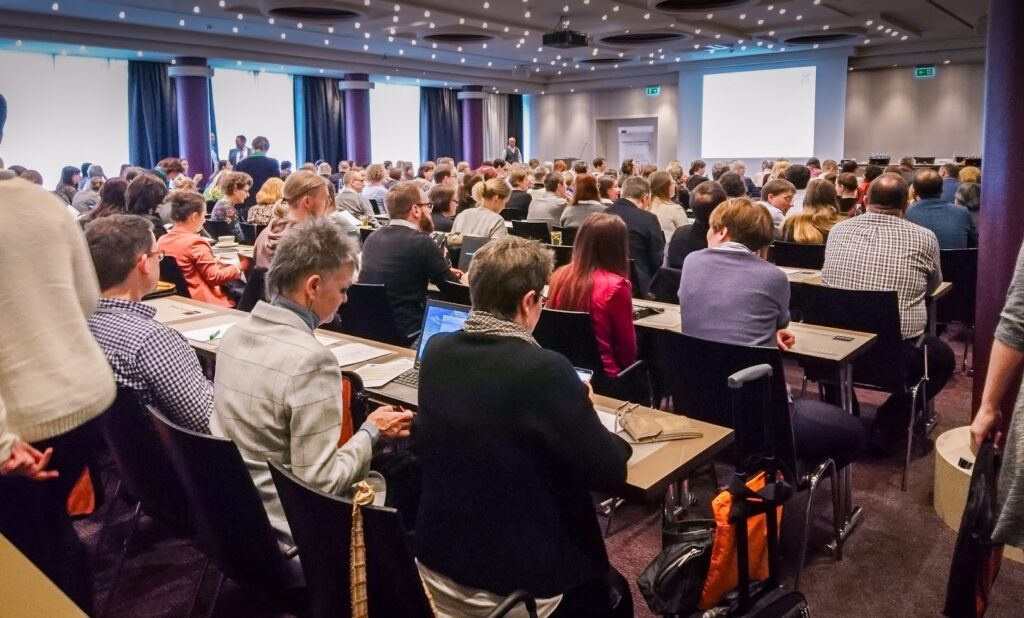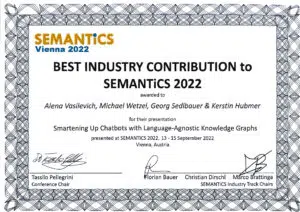
On March 22-24, the 2018 DTT Symposion (short DTT), the bi-annual meeting of the German Terminology Association (Deutscher Terminologietag), took place again in Mannheim. We were exhibiting and I enjoyed talking to many Coreon customers there. It was a truly exciting event this year and according to the organizers the busiest ever. 200+ participants meant a full house!
After half a day of pre-event workshops, the event kicked off Friday morning with a presentation from Martin Volk (University of Zürich) on parallel corpora, terminology extraction, and MT. Martin challenged the hype around Neural Machine Translation and pinpointed some weaknesses: “NMT operates with a fixed vocabulary. But real world translation has to deal with new words constantly … how can we ensure terminology-consistent translation?”. His research confirms what we’ve outlined in an earlier blog post: Why Machine Learning still Needs Humans for Language.
“Concept Maps Everywhere”
Back to the event…as one participant tweeted, concept maps were the dominating topic throughout the few days. Firstly a workshop by Annette Weilandt (eccenca) on taxonomy, thesauri, and ontologies, followed by a presentation by Petra Drewer (University Karlsruhe). Petra unveiled a plethora of benefits:
- insight into the domain
- systematic presentation
- clear distinction between concepts
- identification of gaps
- equivalence checks across languages
- new opportunities in AI contexts
Unsurprisingly, my event highlight was the Coreon customer presentation from Liebherr on the benefits of multilingual knowledge systems. In this very entertaining presentation, Lukas Auer (Liebherr MCCtec) and Johannes Widmann (Liebherr Holding) outlined how pragmatic and effective the work with concept systems turns out. They concluded: “If we all think in networks, why should our termbase then be designed as an alphabetic list of terms??” Instead, the concept system driven approach has many advantages such as training of new staff, context knowledge for technical authors and translators, terminological elaboration of specific domains, insight into the degree of how far a domain is already covered, avoiding doublettes etc. Download a case study from the Coreon website.
DTT 2018 Award for a Master Thesis on Coreon
And then the “i-Tüpfelchen” (cherry on the cake) on Friday afternoon: David Reininghaus received this year’s DTT award on his master thesis: “Applying concept maps onto terminology collections: implementation of WIPO terminology with Coreon”. David analyzed in his work how a real graph driven technology outperforms simple hyperlink based approaches: no redundancies, more efficient, less error-prone. David further developed an XSL-based method how to transform the MultiTerm / TBX hyperlink based workarounds into a real graph, visualized in Coreon.
Deutsche Bahn: Terminology-Driven AI Applications
Tom Winter (Deutsche Bahn and President of the DTT) illustrated in his session how terminology boosts AI applications. Through already simple synonym expansion the intranet search engines are now more meaningful (a search for the unofficial Schaffner, now finds even documents where only the approved Zugbegleiter was used). Other applications are automatic pre-processing of incoming requests in a customer query-answering system or even improving Alexa driven speech interaction at ticket vending machines…who says terminology is still a niche application?
From Language to Knowledge
I am excited about the evolution of the DTT in recent years. How many more participants will we see in spring 2020? I am convinced the more the DTT community continues to leave the pure documentation niche and the more the focus moves onto areas that our customer Liebherr or Tom Winter have illustrated, the relevance and awareness level of the community will continue to grow. So that the organisers can once again proudly announce: Ausgebucht – no more seats left!



